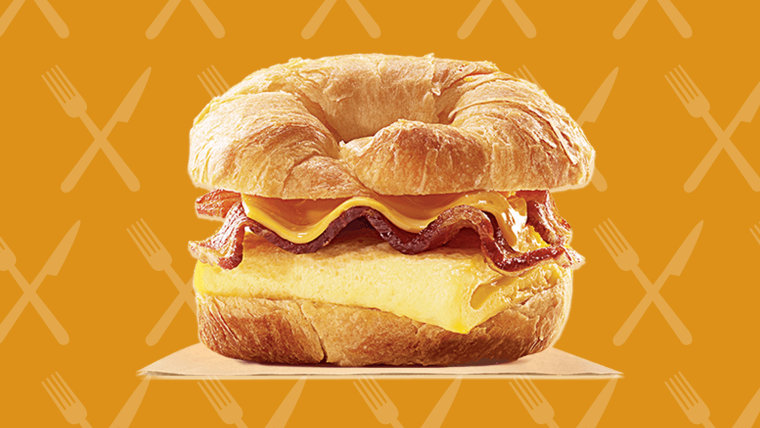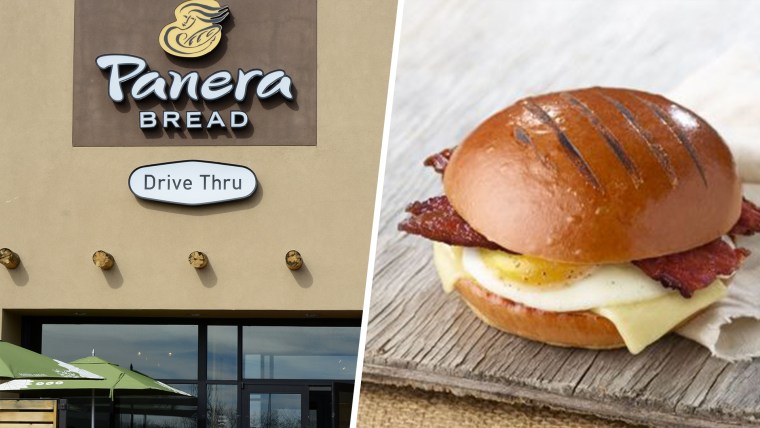Most fast-food chains serve up egg sandwiches on their breakfast menus but, depending on where you go, that egg patty may be a far cry from something you'd crack yourself at home.
A lot of the eggs used in popular egg sandwiches aren't made from just egg yolks and egg whites — many contain extra ingredients people might not know they're eating.
TikTok user Thomas Vezina recently posted a video which purportedly shows a package containing egg patties used at Dunkin'. "This is what our Dunkin' Donuts eggs look like," says a voice, before a hand is seen banging a single frozen patty on the counter a few times. "And it's still good."
While a rep for Dunkin' was unable to verify the authenticity of the video, the egg patties in the video do bear a close resemblance to what the chain uses on its breakfast sandwiches. Those "eggs" are actually made with egg whites, yolks, soybean oil, water, natural flavoring agents, salt and a mix preservatives and stabilizers like xanthan gum, citric acid and cellulose gum.
But Dunkin' certainly isn't the only chain serving up multi-ingredient egg patties. Plenty of fast-food places have egg sandwiches and egg offerings that contain hard-to-pronounce fillers or stabilizers.
According to Starbucks’ nutritional information, its bacon, gouda and egg breakfast sandwich uses a frittata egg patty that contains soybean oil and water, as well as unmodified corn starch, xanthan gum, citric acid and powdered cellulose. And Burger King’s breakfast menu describes its “eggs” as a “liquid egg-pasteurized mixture” that's made with whole eggs, water, xanthan gum, citric acid, medium chain triglycerides and more.
Using these egg patties with extra ingredients allows chains to maintain quality control and preservatives increase their shelf life.

Some chains, however, have taken a stand against using these products.
After Panera released a new line of breakfast sandwiches in 2018, it petitioned the U.S. Food and Drug Administration to define what makes an egg an egg. The chain argued that other restaurant's shouldn't be allowed to market their sandwiches as "egg sandwiches" if a substitute was being used.
“Brands can say they offer an egg sandwich, but sell an egg product that contains multiple additives,” Sara Burnett, Panera’s director of wellness and food policy, said in a news release. Today, Panera's breakfast sandwiches use only 100% freshly cracked eggs.

Another chain that has long touted the fact that it uses freshly-cracked eggs is McDonald's.
But from a nutritional standpoint, does it really matter?
“The main question is whether eggs enriched with other ingredients, even nutrient-rich ones, like milk, should still legally be called eggs,” Madelyn Fernstrom, PhD, health and nutrition editor for NBC News, told TODAY Food.
According to a U.S. Food Safety and Inspection Service document, an egg substitute cannot contain egg yolks. The FSIS defines “egg products” as eggs that have been removed from their shells for processing that may include whole eggs, whites, yolks and various blends, with or without added non-egg ingredients.
So, right now, as long as whole eggs are included, those fast-food patties still qualify as egg products. While the additives may be hard-to-pronounce and impart a less-than-ideal texture, they're not harmful to consume.
“These are all safe to eat,” Fernstrom said after looking over the additional ingredients used in sandwiches from both Starbucks and Burger King. However, she added that “certainly, the gold standard for optimal nutrition and taste is a whole, fresh egg.”
Bonnie Taub-Dix, RDN, creator of Better Than Dieting, agreed. “The closest you can get to eating food that is like something you would have in your own refrigerator, the better,” she told TODAY, advising consumers to seek out nutritional information online and educate themselves about how to find healthier breakfast options.
So should people be worried about preservatives at all? The experts say the real issue lies in having transparency.
"Certain preservatives (not listed in the Starbucks and Burger King items, but possibly in other egg sandwiches), like MSG and sulfites, can cause severe reactions in some people," Frances Largeman-Roth, RDN, told TODAY over email. "The bottom line is that when you get an egg sandwich, you probably just want the egg, and not all the other junk that may be in there."
Taub-Dix added that the bigger hazard may really be what else is on that fast food sandwich.
“What I think is a problem with a lot of these breakfast sandwiches is not just the egg, it’s the company it keeps,” she explains. “If it also has bacon, cheese and mayonnaise, that is a problem for breakfast.”
